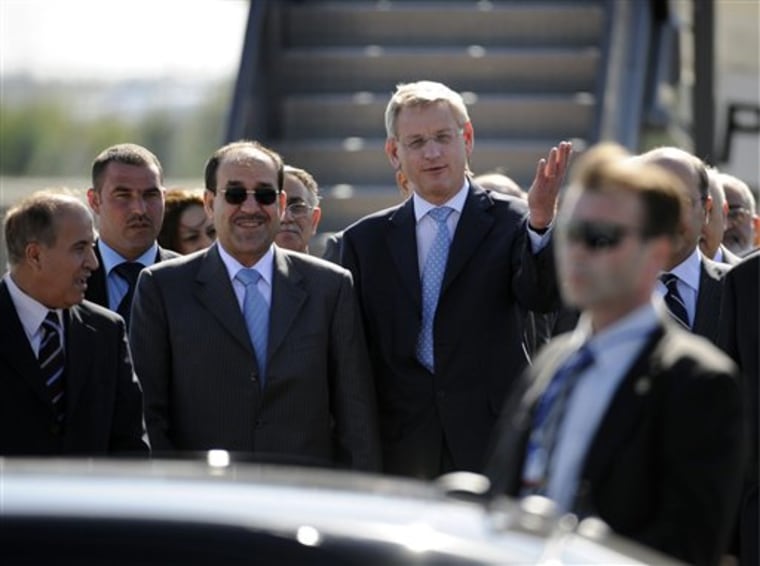Iraqi Prime Minister Nouri al-Maliki is expected to demand that some countries cancel debt dating to Saddam Hussein's regime when he addresses a U.N. conference in Sweden on Thursday.
Al-Maliki arrived in Stockholm amid tight security on Wednesday for the conference, which will review the political and security progress in his country.
"The aim of this conference is to support Iraq," al-Maliki told reporters in Baghdad before his departure to Sweden. "The task of building is more difficult than countering terrorism. We hope that other countries will forgive Iraqi debts."
Iraq harbors at least $67 billion in foreign debt — most of it owed to fellow Arab countries Saudi Arabia, Kuwait, the United Arab Emirates and Qatar.
The Iraqi delegation also included ministers of foreign affairs, finance, planning and national dialogue.
Iraqi and U.S. officials attending the one-day meeting outside Stockholm are likely to tout recent security gains in Iraq. The gathering also will see pressure on Iraqi leaders to make similar movement on political goals, such as reconciliation among the country's Sunni Arabs, Shiites and Kurds.
"Key is, of course, that the Sunni parts of society move more clearly to the governing structures," Swedish Foreign Minister Carl Bildt told The Associated Press in an interview Wednesday.
Sunnis pull out of Cabinet
Iraq's largest Sunni Arab political bloc pulled its members out of Iraq's 39-member Cabinet in August, saying it was not getting enough say in decision-making. Sunni politicians have been negotiating a possible return, but said Wednesday they suspended talks due to a dispute over ministry posts.
Iraq's Sunni Arab minority has long felt it is being sidelined by the majority Shiites and the Kurds, who dominate the Iraqi parliament and al-Maliki's government.
Iraqi government spokesman Ali al-Dabagh told reporters in Stockholm that al-Qaida and interference from Iraq's neighbors were among the biggest challenges to the reconciliation process.
The meeting in Sweden comes as the U.S. military says violence in Iraq has reached its lowest level in more than four years, following a series of crackdowns on Sunni and Shiite extremists.
Some 500 delegates from more than 90 countries are to attend the conference, including U.N. Secretary-General Ban Ki-moon, Secretary of State Condoleezza Rice and Iranian Foreign Minister Manouchehr Mottaki.
It is the first annual review of the International Compact with Iraq, a sweeping five-year economic and political reform package that Ban helped broker last May in Egypt.
The compact defined international help for Iraq — including debt relief — but also set tough commitments on the Baghdad government, particularly carrying out reforms aimed at giving Sunni Arabs a greater role in the political process.
No breakthroughs likely
The Swedish hosts said no major breakthroughs were expected.
"I think the key thing would be to hear what the Iraqis themselves have to say," Bildt said. "This is their conference where they are to explain the policies they intend to pursue."
He said he would not seek to bring together Rice and Mottaki, who pointedly ignored each other at a conference in Kuwait last month, for private talks.
"That's up to them. I don't see that on that particular level," Bildt said, adding that lower-level contacts were possible between the U.S. and Iranian delegations. "I would assume that they would not only devote their time to sightseeing.
In Washington, State Department spokesman Tom Casey appeared to rule out that either Rice or her envoy to Iraq, U.S. ambassador Ryan Crocker, would reprise their sideline contacts with adversaries Iran or Syria.
"I'm unaware of any plans for any contacts of any kind between any U.S. officials and any officials of the government of Syria or Iran, other than incidental passing-in-the-hallway kinds of stuff," he said.
Police said eight different demonstrations were planned in the Stockholm area, including an anti-U.S. rally outside the conference center in Upplands Vasby, about 15 miles north of the capital. Officers from seven counties, the SAPO security police and a national anti-terror unit will be deployed during the conference.
At a seminar in Stockholm on Wednesday, a network of Iraqi women's groups urged the conference to make more room for women in the decision-making process and said at least 25 percent of the members in the Cabinet should be women.
